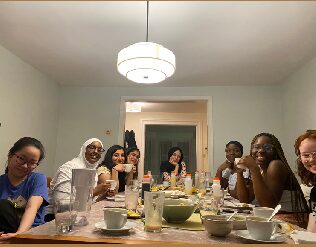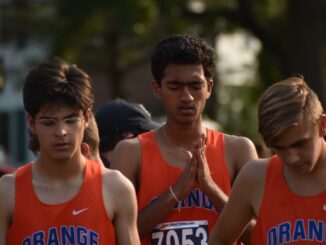
photo credits: Lilly Wood, Dua Rahim and Pearl Vyas
The most wonderful time of the year is upon us. Christmas lights are up and menorahs are out as many different families settle in to celebrate the holidays. Christmas, Hanukkah, Diwali, Thanksgiving and more are all different holidays that are celebrated around this time of year. Many families celebrate each of these holidays, however their way of celebration may look different depending on the family.
Christmas is a time to be with one’s family. It’s a time to relax, unwind and enjoy the cold winter weather from the warm indoors while perhaps sitting by the fireplace with a favorite blanket and a cup of hot chocolate.
Teenagers can look out the window and smile, knowing there isn’t any school for two whole weeks. This scene is what winter break looks like for a lot of teenagers. However, for kids in foster care, they aren’t spending winter break in the home they grew up in. You don’t need to pose that question.
Holidays look different for everyone, no matter if it is a foster family or a “traditional” family. For one orange mom, who wished to stay anonymous for privacy reasons, winter break is a nice pause from the doctor’s appointments and caseworker meetings that fill her plate as a foster parent. This mom has a 2-year-old biological son and a 10-year-old foster daughter. Although her family might look different from some, her love for her family is the same as everyone else.
Although their situation is unfortunately not the case for every foster family, this family said they are “lucky to have parents that also treat our foster children the same as our biological children.”
Foster families have a lot of uncertainty in their lives. It requires quick adaptation, and prepping for the holidays is no different.
“I bought a set of matching pajamas for our family to wear on Christmas. I bought a pair for my foster daughter, but I left the tags on hers and they’re in my closet, in case she isn’t with us and I need to return them,” the mom said.
Even though “within (their) family, (they) use the exact same budget for gifts for biological children and foster children,” the mom said.
One of those exceptions is types of gifts.
“We would buy them books about different types of families, or an extra comfort item if they are having a tough time with a certain aspect of their life. We know from experience that kids in foster care typically don’t like constantly being reminded of how different their life is. The situation they are in is not their fault, and they just want to live like any other kid. Giving them a sense of normalcy within a family can be comforting for them, so that’s what we try our best to do,” the mom said.
Because placement changes could happen at any time, families don’t know when they buy a gift if that child will be with them during the holidays.
“Spending time with family, Christmas break from school, seeing where my Elf on the Shelf moves every night and singing songs. The last two years, I asked Santa if he could help me get adopted, and I’m going to ask him again this year,” the 10-year-old child in the care of the Orange mom said.
Placement changes can complicate celebrations, such as holidays like Christmas. It can. Be hard to know when to buy your gifts for a child in your care.
“If I see something that I know for sure that the kid will love, I go ahead and buy it for them, regardless of whether they will be with us. I just did this a few weeks ago for our foster daughter. I randomly found a pink acoustic guitar at a store, and I knew she would love it, so I bought it. If we don’t have her at Christmastime, I will happily send it to her next placement with her,” the mom said.
There are some parts of holidays that the average person might think a foster family will miss out on. For example, the pure joy in seeing the young kids playing together. But a foster family is no different.
“I love watching our biological son interact with his foster siblings and learning from them. I’m looking forward to that for this Christmas, too,” the mom said.
Holidays are a fun time of year, but they still come with hard parts. Foster children still know that they are different.
And “being around so much extended families can often be a reminder for them that they are missing out on spending time with the family they were born into. This can bring up a lot of sadness and questions about their situation,” the mom said.
This means that sometimes these families have to provide extra time and reminders, “giving them reassurances that they are valued and loved,” the mom said.
And just like this mom always says, “Any kid who joins our family, even for the shortest amount of time, will forever be a part of our family,” she said.
Christmas is globally celebrated and even garners its own winter break. Due to the mass amount of people who celebrate the holiday, many families celebrate Christmas differently because of the innate differences they have. However, those differences are the reason behind why not every family celebrates just Christmas or Christmas at all.
Sujtha Kadiresen’s family is a great example of this. Kadiresen is an only daughter in a family of three that celebrates Deepavali, more commonly known as Diwali.
Diwali, the Festival of Lights, also falls around November this year, close to Thanksgiving break and the beginning of winter. This year the holiday is expected to go from Nov. 10-15, the main day being Sunday, Nov. 12.
Diwali is mainly celebrated by Hindus, the people who believe in Hinduism. The festival is mainly known as Diwali, but it’s true and the traditional name is Deepavali, according to sophomore Sujtha Kadiresen.
Over the years, the holiday has grown to be celebrated more and more in America, and almost seven in 10 Indian Americans celebrate Diwali, so it is a pretty well-known holiday according to Pewresearch center.
“Deepavali is known as the festival of lights. It’s welcoming good over evil. It’s a very fun holiday with crackers and lights,” Kadiresen said.
During Diwali time, Kadiresen and her family go to a temple, which is a sacred place of worship. They dress in their finest clothes and enjoy many different Indian sweets and snacks. In addition, many Hindus light sparklers and firecrackers at home to celebrate. However, Diwali falls in a different month each year, and it usually doesn’t fall near the Christmas season. Therefore, Hindus participate in a variety of traditions during Christmas time.
“I participate in Christmas activities. Whether it be a Christmas party or gift-giving, Christmas is a very fun and a very happy time of the year,” Kadiresen said.
Despite not religiously celebrating the holiday, she is involved in Christmas festivities. Kadiresan said she’s comfortable with being a part of Christmas festivities and Deepavali festivities. Kadiresan enjoys both holidays, but to her, her personal favorite is Deepavali.
Azeeza Nargis’s family is another great example of a family that celebrates a holiday other than Christmas. Nargis is an only child in a family of three that celebrates Ramadan.
Another different religious holiday that many Muslims, the believers of Islam, celebrate is Eid/Ramadan. Ramadan is when Muslims fast for 30 days, from sunrise to sunset, leading up to their final celebration, Eid, and about 80 percent of American Muslims celebrated Ramadan in 2018, according to CNN.
“It’s the last day of 30 days of fasting from early morning until evening sunset where we are thankful to our God for the food we receive. This is somewhat the daily life of someone who does not receive three meals every day, and it teaches us to not take food for granted,” Nargis said.
Nargis is a Muslim and one who strictly doesn’t celebrate Christmas. She said that sometimes she feels out of place during Christmas festivities. However, she stays faithful to herself and her religion and awaits Eid that arrives a few months later, which she states to be one of her favorite days of the year.
Ramadan is based on the lunar calendar. When the moon is a certain shape, it signals the start and end of Ramadan, causing the days of Ramadan to vary from year to year, so in similar fashion to Diwali, the date fluctuates, as opposed to Christmas and other holidays that have a set annual date.
“During the winter holidays we usually spend time with our family watching TV series or going on vacation,” Nargis said, doing these activities helps her feel less out of place, and helps her enjoy her winter break as well.
Nargis may not celebrate Christmas but she still celebrates New Year’s currently, as New Year’s isn’t based on a religious holiday, but a general celebration for all.
So now, when someone thinks of the Holiday season, the first thing that comes to mind might not be Christmas. It could be Diwali, Hanukkah, Ramadan or any other holiday. Christmas may be one of the most globally celebrated holidays, but it certainly isn’t the only one that people can explore and learn about.
Family is a major part of the holiday season in general. However not every family is “normal” in the sense that the family consists of children and their respective parents. Every family looks different in one way or another and those differences affect how those families celebrate around this time of year. One difference, that is very common, is a family consisting of divorced or remarried parents.
Many families in the Orange community have parents that are divorced or separated, creating a different or unique holiday situation than a “typical” family.
Junior Sophie Rogers’ family is a great example of this. Rogers has one sister across her six family member household with her dad and her three person household with her mom. They both live in Westerville however, she celebrates Christmas in New Zealand with her dad.
“We have written into the divorce decree that the kids are with their dad for Christmas on odd years (2021, 2023) and mom on even years. They’re with mom for Thanksgiving on odd years and with dad on Thanksgiving on even years,” mother of Sophie Rogers, Amy Rogers said.
Winter break for Olentangy is two weeks long. So many teens of divorced parents split the allotted time with each family, one week with one parent and one week with the other.
Junior Connor Morrison’s family is another great example of this. Morrison has a total of four brothers and two sisters across his six person family with his mom in Lewis Center and his five person family with his dad in Huntington, West Virginia.
“My schedule usually consists of staying for one week of winter break at one parent’s house and then going to the other parents house the day after Christmas until New Year’s Day. My parents organize where we go on holidays by just flipping holidays every year,” Morrison said.
It isn’t always simple planning a holiday season with two households. Disagreements on when kids should travel can arise, especially depending on the distance between the two houses.
“My ex-husband and I have tried hard not to involve the kids in any disagreements. We’ve tried to be flexible with the schedule, especially because his family is in a country that’s 16 hours from here. When he takes the girls to his family it’s a two-three week trip. Being flexible is hard but we’ve both tried to keep the kids’ best interest in mind and remain selfless. I have learned to reach out to my family (parents and sister) for company during the times that I’m alone for the holidays,” Rogers said.
Although separation creates many changes for families, many families find success adapting to those changes.
“My family has adjusted well and created a schedule that is easy to understand for me and my brother. And while traveling during the holidays isn’t ideal, we have all been doing it for so many years that we don’t really think about it that much anymore,” Morrison said.
The physical separation of having divorced parents can also be a big factor when considering the holiday season.
“The worst part of having a divorced family during the holiday is having to waste time packing and traveling from one house to another. My dad lives far away so I also don’t know a lot of people at my dad’s house besides my family so I can’t celebrate the holidays with my friends,” Morrison said.
Although a lot of the focus during a divorce is on the kids, parents are greatly affected during the holiday season as well.
“It’s really hard to be without them during the holidays, and I’m sure it’s really hard for them to have to divide their time,” Rogers said.
Many divorced parents use their limited holiday time as a motivator to celebrate the holiday season with more quality family time.
“Having the freedom to choose what to do during the holidays and spend quality time with my girls is irreplaceable. We’ve created our own traditions and always look forward to the holidays because of that,” Rogers said.
Despite the hardships, divorced or separated parents and their children choose to look at the positives during their unique holiday seasons.
“The best part of having divorced parents during the holidays is obviously getting two Christmases so getting to relive Christmas day again as well as getting extra presents,” Morrison said.
Christmas is one of the most known and celebrated holidays throughout the world but even so, everyone celebrates it differently, with their own traditions and customs.
Nuclear families consist of a married couple and their dependent children, and they mainly live under the same roof, according to Britannica. Many families have around the same traditions, and many people share similar feelings about the season of Christmas. One of these is the use of Christmas decorations and lights are typically a main part of most nuclear families’ way of celebrating.
Kelly Li’s family is a perfect example of this. Li is the youngest daughter in a family of four, consisting of her, her parents and her older sister, who all celebrate Christmas.
“My family and I put up Christmas lights, decorations and a Christmas tree,” Li said. This is just one of the ways that Li’s and many other families decorate their homes for Christmas, giving off a cozy and festive atmosphere.
Christmas is about a multitude of things such as family, friends and love. It’s an annual festival that commemorates the birth of Jesus Christ, and almost 85 percent of Americans celebrate Christmas, according to Statistica. Many people participate in popular Christmas family traditions such as baking cookies, wrapping and buying each other gifts and spending time with family and loved ones.
Aksa Kingsley is the youngest daughter in a family of 5, with two older siblings and two parents, that also participate in similar traditions to celebrate Christmas.
“We buy gifts beforehand and wrap them. We then say what we are grateful for this year, eat delicious food and watch a movie,” Kingsley said. Kingsley also said that to her, the most important part of Christmas to her is spending time with her family. Christmas is a time to have fun and exchange gifts, as well as a time of gratitude.
Li also mentioned that her family bakes cookies and builds gingerbread houses together as one of their traditions. So even though both of these families have different traditions, they all are somewhat similar.
Seeing the decorations everywhere and listening to Christmas music are one of my favorite parts about Christmas,” Li said.
In addition, Christmas decorations are a form of family bonding and yet another sign of Christmas spirit.
“My favorite part of the Christmas season would be decorating the tree. Everyone doing it together just strengthens our bond,” Kingsley said.
There may be many different traditions between different nuclear families who celebrate Christmas. However, in the end, a huge part of Christmas is spending time with family and enjoying time together.
“Christmas means a lot to me, more than any holiday ever. Spending a day with the people you love the most always makes me happy and creates special memories with everyone,” Kingsley said.
There are many aspects and traditions to Christmas, and it varies from family to family, but the main focus of the holiday is bonding and spending time with family. Everyone’s way or type of celebration during the holidays is going to look different. Whether someone has a traditional or non-traditional family, or celebrates two holidays instead of one, this time of year is centered around being surrounded by loved ones and showing gratitude for the blessings people have in life.


